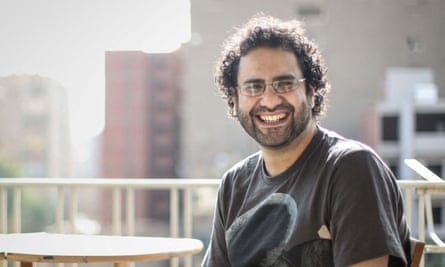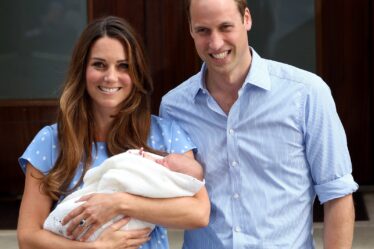
The drive north out of Cairo from my family home is one I know well. It’s the route up to the coastal city of Alexandria, a joy-filled trip I often used to make to Egypt’s north-coast beaches. On the morning of 17 November 2022, however, almost exactly a year ago today, the journey could not have felt more different. We might have been travelling in that same direction, but our destination this time was the prison where my older brother, Alaa Abd El-Fattah, is locked away. He’s one of Egypt’s most high-profile pro-democracy activists. A political prisoner, he’s been in various jails for much of the past nine years. On the day of our visit, Alaa had spent the last six days refusing all food and water – the culmination of a 200-day partial hunger strike we’d all hoped might help secure his release. We had no idea what state we’d find him in.
At 9am, my mother, aunt and I piled into a car and headed out towards the modern prison complex deep in the desert. We sat in silence – there was nothing to say. Pulling up to the compound, we all knew the drill: jump out, show officials our documents and then sit around for hours and hours. The wait that day felt especially anxious. Days previously, our family had received two short handwritten notes from Alaa, which proved he was alive. The first letter stated he was drinking water again. The second that he was eating, too, and that on our visit we should bring a birthday cake. A few days later, he’d be turning 41.
For hours, my mum and aunt had stressed about what type of cake to bring, but I refused to engage. All I could focus on was how we’d failed to free him. Just 500km away, in Sharm el-Sheikh, world leaders were meeting for Cop27, the annual UN climate conference. Through the hard work of thousands of people, we’d managed to make Alaa’s imprisonment a major international news story to coincide with it. The world’s attention was on my brother, and I felt as if he’d given in too soon. That he had no idea, behind bars, how close we might have been to getting him out and that the authorities offered him a few tiny things – to listen to music, access to sunlight, some vague promise to re-evaluate his case – and in exchange he called off his strikes and we’d lost our leverage. We’d given in for less than Alaa’s freedom.
Midafternoon, we were taken to the visitation room, empty except for security guards dressed in riot gear. Months had passed since I’d last seen my brother. Alaa was thin, his cheekbones protruding far more than they should, his eyes popping out from his face. The way he spoke, however, was gentle and soothing. The visit lasted half an hour. He described a near-death experience: after days of no water and months of no food, he’d been incredibly unwell. He’d collapsed in the bathroom. Waking up on the floor, he was put on drips. Then, out of nowhere, he was hearing music – for the first time in three years. Pink Floyd’s Comfortably Numb. An officer had played the song in the hope of bringing him round. He talked to us about our family. His son. Our pregnant sister. He was very emotional. At the end, we were briefly allowed to hug – our first embrace in three years. I felt how frail he was. As I held him, something softened in my mind. Pushed to the brink, I’d become so focused on my strategy to get him out that I’d forgotten Alaa’s humanity. In that moment, all I could feel was gratitude that he was alive.
I’m the youngest of three siblings; Alaa is the oldest. Because of the 12-year age difference, he was both a sibling and a parent figure to me growing up. He took me to museums, concerts, sculpting lessons and break-dancing classes. As a kid, I had a habit of opening up electronic devices to see what was inside – our mum wasn’t best pleased when I dissected the washing machine. When I got my first laptop, Alaa sat with me and together we explored within. He’s not just my brother, but a friend and mentor. I miss his advice and his friendship. The other day, I went to see the new Scorsese movie and I kept thinking how much he’d have enjoyed it. I have a list of movies, TV shows and music that he’s missed in the last nine years waiting for him.
The fight for Alaa’s freedom began in 2011. Since then, family, friends and many others have been relentless. Last year, we decided to focus our efforts on the international community, instead of on domestic campaigning. With Egypt hosting Cop27, the Egyptian government had an opportunity to clean up their image in front of a global audience. It was a huge PR opportunity and we needed to convince politicians to bring up Alaa’s case, ensuring that smiling for the camera alongside the Egyptian president was contingent on the release of political prisoners.
I’ve been imprisoned three times – and my mum and sister assaulted – for campaigning for my brother’s release. My family’s ordeal is not unique – there are tens of thousands of political prisoners in Egypt. But we know that putting pressure on the authorities can work, which is how I made it out of prison myself the most recent time in 2021. Following my most recent release, I took the book of essays my brother had written while in prison, You Have Not Yet Been Defeated, on an international tour. I met activists, journalists, politicians and diplomats to generate support. Each time, I told our story – my brother is a British-Egyptian software developer and writer imprisoned for the ideas in this book. He was prominent during the Arab Spring as a pro-democracy activist, his voice resonating with people across the region. The Egyptian authorities worry he’ll become a Nelson Mandela figure when he’s released. That’s nonsense. He’s just a father, with a son on the spectrum, who desperately wants to be a present parent; a techie kept offline waiting to rebuild his career. Support for our campaign grew, but though we are British citizens, the UK government wasn’t moving. I decided to make myself impossible to ignore, and, in October last year, pitched a tent on Whitehall outside the Foreign Office. I spent 20 days living there while Alaa escalated his hunger strike.
It’s then that we started to get real attention. Alaa was in newspapers worldwide and I was invited on to television and radio shows. It was a relief, but also exhausting. None of this comes naturally to me. I’m an introvert, so I hate the spotlight and photos. When my brother heard I was doing public advocacy, he wrote to me, asking: Sanaa, is it that bad? As Cop27 began, I flew to Egypt. It’s all a blur of interviews, meetings, speeches and events. For five nights, I barely slept. There was a single apple in my bag, which I spent 48 hours nibbling.
I’ve no idea how I managed to get through that period. My solace was climate activists and human rights groups – we planned and strategised together. They shared my burden as if it was their own. In the most difficult times for my family, it’s solidarity from people around the world that has given us hope. In the company of politicians though, I felt helpless. Those in power – the ones who could easily change the course of Alaa’s life – have endless ways of telling you there’s nothing they can do. On 5 November last year, Rishi Sunak wrote to me: “We are totally committed to resolving your brother’s case… Ministers and officials continue to press for urgent consular access to Alaa as well as calling for his release.” It’s clear that isn’t happening. Alaa’s release date is set for January 2027. That’s three more years of my brother’s life stolen from him. Just maybe, this story will help remind the prime minister of his pledge to us a year ago.
Most of the letters between Alaa and me now are us joking about how I’m living his life while he sits in prison. I can’t wait for him to get out and take over. Alaa’s 13-year-old son lives in Brighton: he’s building a life there, while waiting for his dad. My sister lives in London – she’s just had her first child. I’m based in London, too, but since my release I’ve been in limbo, living out of a suitcase. I’ve not yet had the space to put down roots. All that will wait until Alaa has his freedom.
Our mum is in Cairo. Every week she delivers food, laundry, letters and books to the prison. Once a month she’s allowed to see him for 20 minutes behind a glass barrier. And every couple of months, she’s allowed a hug. Sometimes I wake up terrified that this might be what our lives look like forever. It can be hard to believe a situation is “temporary” when it’s lasted nine years. At times, normal life feels like a distant memory.
Alaa was always protective of me when I was younger. In our letters, he always writes how he struggles to think of me now as a 30-year-old woman. His world has been paused; in his head, I’m still that kid sister. Now it’s me trying to look out for him. That really affects my brother – he thinks that it’s unfair on me. But I know he’d do the same for me; it’s just what you do for your family.
Sanaa Seif was talking to Michael Segalov



